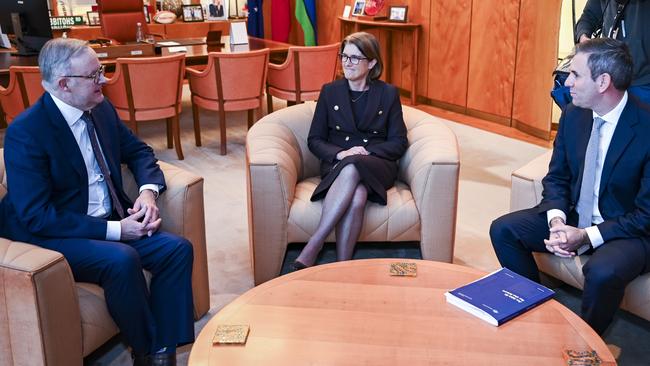Rate cut may not deliver PM election boost
A rate cut next week will not deliver Anthony Albanese the massive pre-election boost that Labor MPs are hoping for, according to polling showing crime remains a top issue for voters.

A rate cut next week will not deliver Anthony Albanese the massive pre-election boost that Labor MPs are hoping for, according to new polling that shows crime and anti-social behaviour continue to surge as top voter concerns.
Amid speculation the Prime Minister could call a pre-May election if the Reserve Bank board lowers the 4.35 per cent cash rate at its first meeting of the year next Tuesday, voters are not identifying rate cuts as a priority issue.
An SEC Newgate Mood of the Nation survey, which polled 1865 Australians in every state and territory between January 30 and February 3, shows only 8 per cent of voters mentioned “interest rates” when citing unprompted concerns.
Despite optimism in Labor ranks that a first rate cut since November 2020 would deliver an election-eve shot in the arm, concerns about interest rates trailed cost-of-living (71 per cent), housing affordability (32 per cent), crime (18 per cent), healthcare (13 per cent), government performance (11 per cent) and climate change (11 per cent), and were on par with grocery prices and immigration.
Tracking the top 36 national priorities, voters ranked keeping interest rates low ninth, behind reducing cost increases for households, investing more in healthcare, reducing crime and anti-social behaviour and strengthening the economy. While between 59 and 73 per cent of voters ranked economic, health and public safety issues as extremely important, just 48 per cent mentioned “keeping interest rates low”.
The Australian last month revealed that since the 1990 election, interest rate cuts and hikes in the 12 months ahead of polling day or during campaigns had minimal impacts on final election results. Following next week’s meeting, the RBA board can meet at most once more before the election, which is due by May 17.
With cost-of-living and housing pressures dominating voter concerns, 34 per cent of Australians think the economy will deteriorate in the next three months compared with 51 per cent who believe economic conditions will improve over three years.
Labor and the Coalition remain neck and neck on who voters feel is the better party to manage the cost-of-living crisis. Australians are most concerned about grocery prices, insurance premiums, rent, electricity bills, mortgage repayments, petrol prices, gas bills, water charges and road tolls.
SEC Newgate research partner David Stolper said: “Concerns about crime levels, particularly youth crime, are continuing to edge up, with housing and healthcare amongst other top issues.
“The new year has brought a slight lift in the national mood, possibly buoyed by expectations that the RBA may begin to start cutting interest rates, as early as mid-February.
“Cost-of-living continues to dominate the political agenda with most Australians nominating it as their top vote-influencing issue and both major parties are in a neck-and-neck battle for who’s seen to be best at easing the pressure on household budgets.
“The federal government will be able to take some comfort from the finding that Australians feel that economic conditions are stabilising, but it cannot ignore that people are still feeling significant financial pain.”
The Mood of the Nation survey shows 32 per cent of voters rate the Albanese government’s performance as good. The only government with a worse rating is Labor in Victoria, where 28 per cent of people rate Jacinta Allan’s government as good. The best performing governments are Roger Cook’s Labor in Western Australia (53 per cent), Peter Malinauskas’s Labor in South Australia (48 per cent), Chris Minns’s Labor in NSW (38 per cent) and David Crisafulli’s LNP in Queensland (36 per cent).
The poll reveals voters are split or undecided about long-term energy blueprints proposed by Mr Albanese and Mr Dutton, with 34 per cent preferring Labor’s renewables-focused plan, 28 per cent backing the Coalition’s nuclear-focused strategy and 38 per cent sitting on the fence. On the Coalition nuclear policy, 34 per cent of voters (down from 38 per cent in November) support the zero-emissions technology, with 27 per cent undecided and 39 per cent opposed. Only 25 per cent of voters said the nuclear pitch would make them more inclined to vote for the Coalition.
After Donald Trump’s return to the White House and his dismantling of diversity, equity and inclusion policies, 29 per cent of Australian voters say companies and organisations are focusing too much on DEI initiatives. That grows to 31 per cent for workers at large organisations with more than 200 employees. One in two voters say current settings are fine or don’t have a position.




To join the conversation, please log in. Don't have an account? Register
Join the conversation, you are commenting as Logout